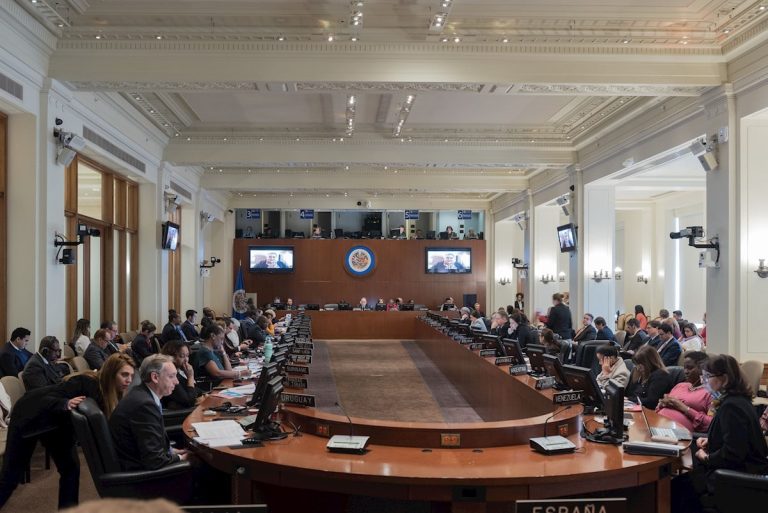10 de noviembre 2023

European Concern over Lack of Academic Freedom in Nicaragua

PUBLICIDAD 1M
PUBLICIDAD 4D
PUBLICIDAD 5D
The OAS will continue to monitor the situation in Nicaragua, warning that human rights obligations do not stop with the denunciation of the OAS Charter

Photograph provided by the Organization of American States (OAS) that shows a general view of the plenary session of the Permanent Council during a meeting at the organization’s headquarters in Washington. Photo: OAS.
The Permanent Council of the Organization of American States (OAS) decided that, after November 19, 2023, when the two years for Nicaragua’s exit from the OAS expires, the organization will continue “to pay special attention to the situation in Nicaragua” and emphasize that leaving the organization “does not leave without effect” the legal obligations and Inter-American conventions that the country has ratified.
This pledge of member states was stated through the resolution Measures Consequent to Denunciation of the Charter of the Organization of American States by the Republic of Nicaragua, approved on Wednesday, November 8, by consensus of the 32 delegations. After the approval, two footnotes were added, one from El Salvador and another from Brazil.
The resolution emphasizes that Nicaragua’s denunciation of the OAS Charter “does not nullify the other legal obligations for which it is responsible by virtue of its ratification of other inter-American conventions, in particular, but not only, those related to the promotion and protection of human rights”.
It also affirms that Nicaragua, even if it ceases to belong to the OAS, “remains bound to respect all human rights reflected in customary norms; all human rights contained in the multilateral human rights conventions to which Nicaragua is a party, as well as those derived from general principles of international law that ensure universal protection for human dignity.”
On November 19, 2021, the regime of Daniel Ortega and Rosario Murillo notified OAS Secretary General Luis Almagro of its decision to denounce the OAS Charter and announced its withdrawal as a member of the organization in accordance with Article 143.
Article 143 also establishes that after two years from the date on which the General Secretariat receives a notification of denunciation, the Charter shall cease to have effect with respect to the denouncing State, and the latter shall be disassociated from the organization after having complied with the obligations under the Charter.
The decision of the dictatorship was based on alleged and “constant interfering attitudes” of the OAS, regarding the approval of resolutions referring to the Nicaraguan crisis in which the abuses of the regime were condemned.
In view of Nicaragua’s imminent departure from the regional organization, the Permanent Council will continue to “pay special attention to the situation in Nicaragua, making its best efforts to promote and encourage Nicaragua’s full respect for human rights and fundamental freedoms of all citizens of Nicaragua,” the resolution states.
Uruguay’s permanent representative, Ambassador Washington Abdala, maintained that the regime of Ortega and Murillo “won’t get off that easy of the defense of human rights” and expressed his desire that the regime would return to the Inter-American system to tell them in their face “what they really are.”
“No Mr. Ortega. You are not going to get off so easily from the defense of human rights on the continent. It won’t be so simple, it should not be so simple,” warned the Uruguayan ambassador after explaining that the Nicaraguan regime has crossed all the red lines.
“This is not an ideological issue, neither of leftists, nor of rightists, this is a basic issue. We are talking about the defense of the lives of Nicaraguans, not of one or two but of hundreds of Nicaraguans who are having a hard time, a very hard time, because of a dictatorship that is one of the worst in the continent”, denounced Abdala.
The Permanent Representative of Costa Rica, Ambassador Alejandra Solano, recalled that the notion of collective guarantee in the Inter-American systems implies a duty of the Inter-American States to act jointly and cooperate to protect the rights and freedoms to which they have committed themselves internationally.
“We reiterate our deep concern for the human rights violations in Nicaragua, for the illegal and arbitrary decisions made to the detriment of its own citizens, non-governmental organizations, against educational centers and against members of the Catholic Church in Nicaragua,” commented the Costa Rican ambassador.
Solano also urged the international community to continue to closely monitor the situation in Nicaragua and to work together to safeguard the human rights, fundamental freedoms and dignity of all its citizens.
The Permanent Representative of Canada, Ambassador Stuart Savage, expressed that his country will continue to work in favor of the human rights of Nicaraguans and reiterated that “Nicaragua continues to have obligations with different human rights conventions” despite its departure from the organization.
“Canada will continue to work with all delegations to keep the door open for dialogue and genuine engagement with the Nicaraguan government. We hope that Nicaragua will one day be able to return to this organization,” the Canadian ambassador stressed.
This article was originally published in Spanish in Confidencial and translated by Havana Times. To get the most relevant news from our English coverage delivered straight to your inbox, subscribe to The Dispatch.
PUBLICIDAD 3M
Confidencial es un diario digital nicaragüense, de formato multimedia, fundado por Carlos F. Chamorro en junio de 1996. Inició como un semanario impreso y hoy es un medio de referencia regional con información, análisis, entrevistas, perfiles, reportajes e investigaciones sobre Nicaragua, informando desde el exilio por la persecución política de la dictadura de Daniel Ortega y Rosario Murillo.
PUBLICIDAD 3D